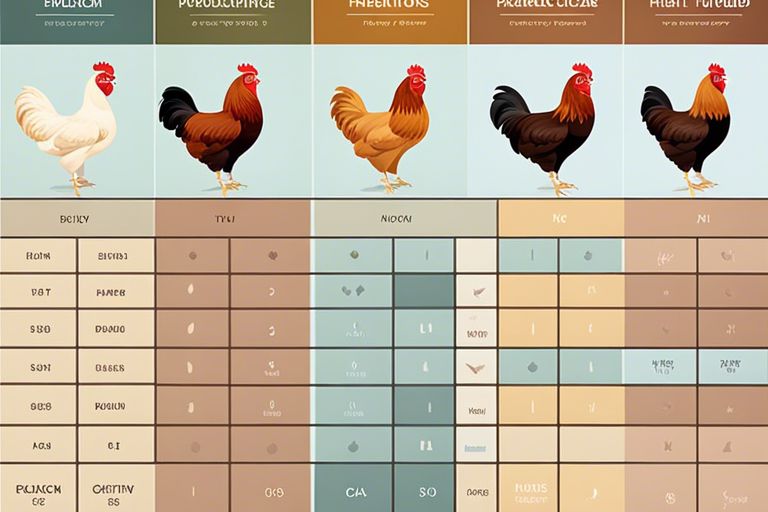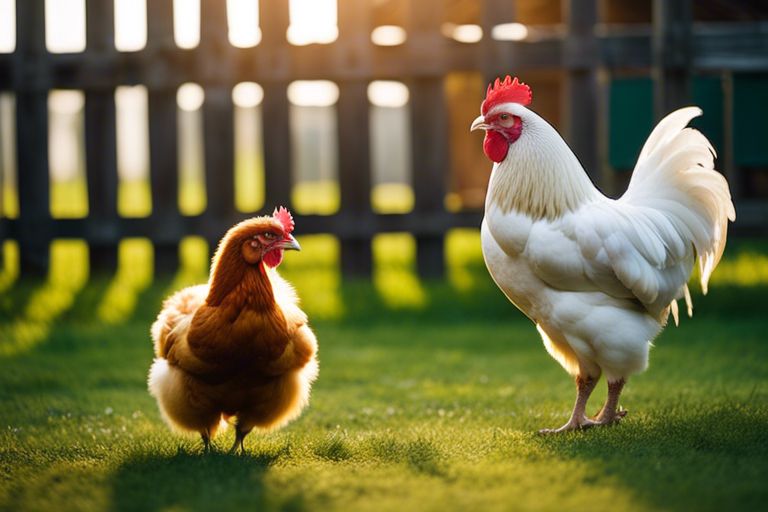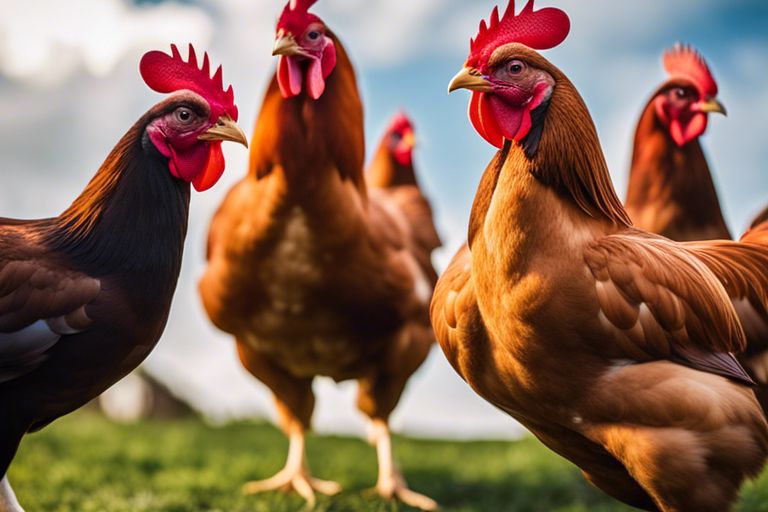It’s vital to comprehend the distinctions between heritage and hybrid chicken breeds for those interested in raising poultry. Heritage breeds are traditional, old-fashioned breeds that have been around for centuries, prized for their historical significance and hardiness. On the other hand, hybrid breeds are the result of selective breeding for specific traits, such as high egg production or fast growth. By understanding the differences between these two types of chicken breeds, individuals can make informed decisions when selecting the right breed for their flock.
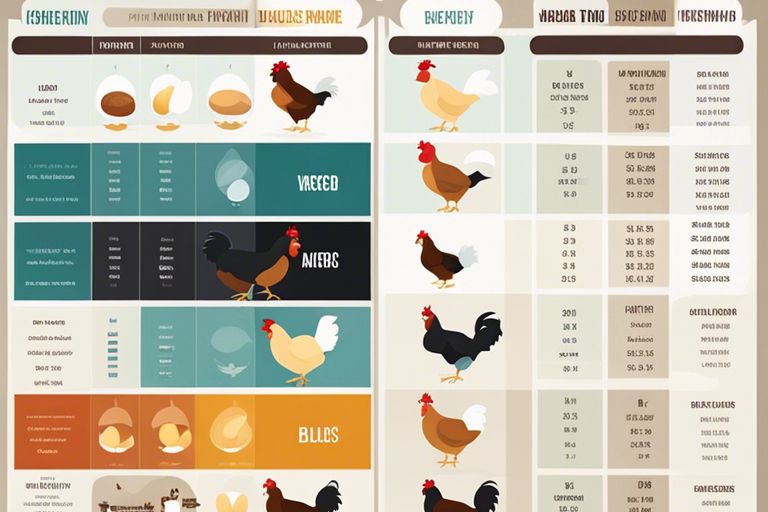
Heritage Chicken Breeds
History and Development
With a rich history that dates back centuries, heritage chicken breeds have been meticulously bred and preserved to maintain their unique genetic traits and characteristics. These breeds are a link to the past, with deep cultural significance and historical importance.
Characteristics and Traits
Breeds such as the Rhode Island Red, Plymouth Rock, and Wyandotte are just a few examples of heritage chicken breeds known for their hardiness, foraging abilities, and excellent egg production. These breeds typically have dual-purpose capabilities, excelling in both meat and egg production.
Plus, heritage chicken breeds often exhibit vibrant plumage and distinctive features that make them a visually appealing addition to any flock. Their diverse colors and patterns add a touch of beauty to the barnyard, making them stand out from their hybrid counterparts.
Benefits of Raising Heritage Breeds
Breeds like the Sussex, Orpington, and Marans are prized for their flavorful meat and rich, flavorful eggs, making them a popular choice among homesteaders and small-scale farmers. Additionally, heritage breeds tend to be more self-sufficient and better equipped to thrive in a free-range environment.
For instance, raising heritage breeds can contribute to biodiversity and help preserve rare and endangered chicken breeds from extinction. By supporting these breeds, farmers and backyard enthusiasts play a vital role in conserving genetic diversity in poultry populations.
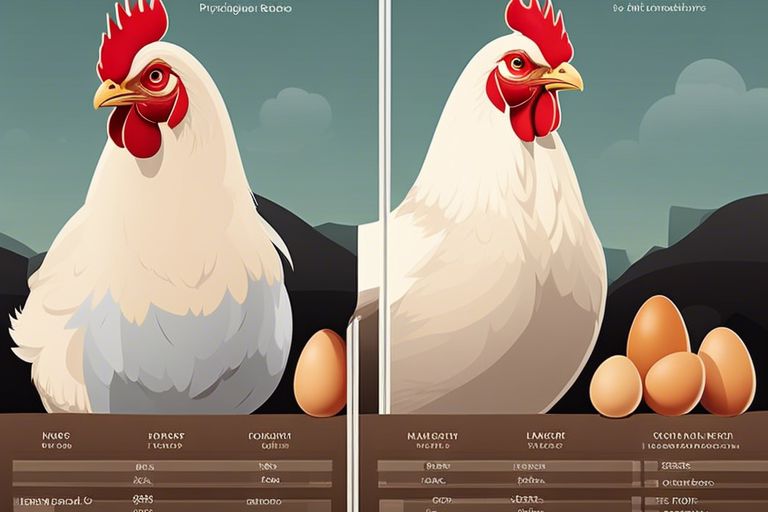
Hybrid Chicken Breeds
Creation and Purpose
With the advancement of poultry science, hybrid chicken breeds have been developed by crossing two different pure breeds to achieve specific characteristics. The purpose of creating hybrid breeds is to enhance traits such as growth rate, egg production, and disease resistance.
Distinctive Features
Purposeful selection of parent breeds with complementary traits results in hybrid chickens that exhibit a combination of desirable characteristics from each lineage. This may include improved feed conversion, high egg-laying capacity, and faster growth rates compared to traditional heritage breeds.
Advantages of Hybrid Breeds in Poultry Production
Production efficiency is one of the key advantages of using hybrid chicken breeds in commercial poultry operations. These hybrids are bred to prioritize certain traits that maximize output, such as increased egg production, uniform growth, and overall hardiness.
A blend of genetic backgrounds in hybrid chicken breeds offers a wider gene pool, reducing the risk of inbreeding and improving overall health and vitality in poultry flocks. This diversity also contributes to increased resistance to various diseases and environmental stressors, making hybrid breeds a popular choice for modern poultry farming.

Comparing Heritage and Hybrid Breeds
| Lifespan and Health
Breeds | Egg Production and Quality
For |
Lifespan and Health
Breeds
Egg Production and Quality
For instance, when comparing heritage and hybrid chicken breeds, it is important to consider egg production and quality. Hybrid breeds are specifically bred for high egg production, often laying more eggs than heritage breeds. While this may be desirable for those looking for a steady supply of eggs, it is important to note that this high productivity can sometimes lead to health issues in hybrids.
Impact on Biodiversity and Conservation
Conservation
The impact of choosing between heritage and hybrid chicken breeds goes beyond individual preferences. Conservation of heritage breeds plays a crucial role in preserving genetic diversity within the chicken population. By supporting heritage breeds, we contribute to the conservation of traditional genetic traits that may be lost if these breeds are not maintained.
Ethical and Sustainable Considerations
Welfare Issues
Not only are ethical considerations important when it comes to deciding between heritage and hybrid chicken breeds, but welfare issues also play a significant role. Heritage breeds are often more well-adapted to free-ranging conditions and can exhibit natural behaviors such as foraging and dust bathing, promoting better welfare overall.
Role in Small-Scale Farming and Local Food Systems
Considerations for the role of chicken breeds in small-scale farming and local food systems are crucial for sustainability and community engagement. Heritage breeds, with their ability to thrive in a variety of environments and their potential for genetic diversity, can contribute to a more resilient and sustainable food system.
Small-scale farmers can benefit from working with heritage breeds by preserving valuable genetics and contributing to the preservation of rare or endangered breeds. Additionally, these breeds often have a unique flavor profile that can enhance the quality and diversity of local food products.
Final Words
To wrap up, understanding the differences between heritage and hybrid chicken breeds is crucial for any poultry enthusiast or farmer. Heritage breeds offer a connection to the past, with unique characteristics and traits that have been passed down through generations. On the other hand, hybrid breeds are specifically bred for productivity and efficiency, often outperforming heritage breeds in terms of egg production or size. By being aware of these distinctions, poultry keepers can make informed decisions about which type of chicken breed best suits their needs and preferences. Whether you’re looking for traditional appeal or maximum efficiency, knowing the differences between heritage and hybrid breeds will help you raise a healthy and thriving flock.
FAQ
Q: What are heritage chicken breeds?
A: Heritage chicken breeds are traditional breeds that have been raised for generations. They typically have specific characteristics that make them well-suited for certain tasks, such as brooding eggs or foraging for food.
Q: What are hybrid chicken breeds?
A: Hybrid chicken breeds are the result of cross-breeding two different chicken breeds to create birds with specific traits, such as increased egg production or faster growth rates.
Q: What are the main differences between heritage and hybrid chicken breeds?
A: Heritage chicken breeds are known for their ability to thrive in a free-range environment and for their historical significance, while hybrid breeds are typically bred for specific commercial purposes, such as egg or meat production.
Q: Which type of chicken breed is best for small-scale farming?
A: Heritage chicken breeds are often recommended for small-scale farming operations due to their ability to forage for food and their resilience to various environmental conditions.
Q: Are heritage chicken breeds more expensive to raise than hybrid breeds?
A: Heritage chicken breeds may be more expensive to raise initially, as they often require more space and time to mature. However, in the long run, they may be more cost-effective due to their self-sufficiency and ability to reproduce naturally.
Q: Do heritage chicken breeds lay fewer eggs than hybrid breeds?
A: Heritage chicken breeds generally lay fewer eggs than hybrid breeds, but their eggs are often prized for their superior flavor and nutritional quality.
Q: How can I determine whether a chicken breed is heritage or hybrid?
A: You can research the breed’s history and characteristics to determine if it is a heritage breed. Hybrid breeds are typically created by commercial breeding companies and are often marketed for specific traits like egg-laying or meat production.
